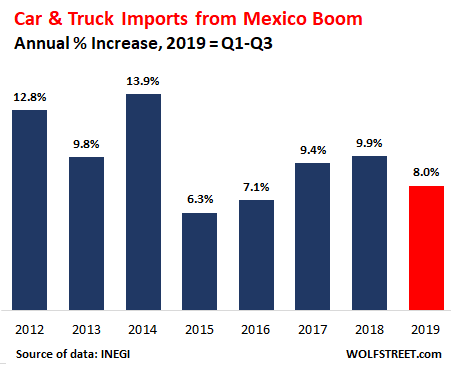GM, Ford, BMW, VW, Honda Shift More Production to Mexico. Auto Imports Surge Despite Decline in US Sales
by Nick Corbishley, Wolf Street:
 But Mexican exports to other countries plunge, tripped up by global auto slowdown.
But Mexican exports to other countries plunge, tripped up by global auto slowdown.
Automakers continue to shift their production base from the U.S. to Mexico, where labor costs pale in comparison with those in the U.S., despite growing opposition from U.S. auto workers and their unions. U.S. imports of new vehicles from Mexico surged by 8% in the first three quarters of 2019, according to the auto manufacturers association AIMA, released by Mexico’s National Institute of Statistics and Geography (INEGI). This surge has occurred even as total deliveries of vehicles to end-users in the US fell by 1.6%.

Between January and September 2019, 2.03 million new vehicles were dispatched from assembly plants in Mexico to the U.S. market, 158,000 more than during the first three quarters of 2018. In the last eight years, auto imports from Mexico have almost doubled, from 1.3 million in 2011 to 2.57 million last year, at annual growth rates of between 6.3% and 13.9%. Barring any major supply chain hiccups, the U.S. is on track to import over 2.7 million new vehicles from Mexico this year.
The latest figures cement Mexico’s position as number one exporter of automobiles to the US, ahead of Canada in second place. According to AIMA, 16% of the 12.7 million cars and other light vehicles delivered in the U.S. in the first three quarters of 2019 were assembled in Mexico.
General Motors: About 29% of those vehicles were produced by General Motors plants in Mexico. GM imports from Mexico increased by 21% YTD, to 587,569 units. Those GM imports represent 27% of all vehicles GM delivered year-to-date in the US. Over 99% of the vehicles GM produces in Mexico are hot-selling “trucks” — including its Chevrolet Silverado and GMC Sierra 1500 pickups, plus SUVs, and compact SUVs (crossovers).
The Chevy Blazer is a brand-new crossover that GM launched earlier this year as a 2020 model. It is being built exclusively in Mexico, much to the chagrin of the UAW which called for a consumer boycott of the vehicle in the U.S. After the ramp-up period, monthly output now exceed 9,000 vehicles.
When it comes to new vehicles, what most U.S. drivers want are SUVs, compact SUVs, or pick-up trucks. And that is what most car companies catering to the U.S. market are now producing in Mexico. In the first nine months of this year, GM, Chrysler, Audi, Honda, Nissan, Toyota and VW, imported 1.34 million SUVs and pickups from Mexico, up 12% from the same period of last year.
Ford also expanded its production operations in Mexico this year. The company’s total imports from Mexico rose 18.3% in the first three quarters of this year, following years of contraction due largely to the U.S. consumer’s waning appetite for new cars — which is all Ford builds In Mexico.
The other big movers over the last three quarters were:
- BMW became the 12th major automaker to set up operations in Mexico. Since opening a new state-of–the-art plant in San Luís Potosi this summer, it has imported 8,500 vehicles to the U.S. to Mexico.
- Volkswagen increased its imports from Mexico to the U.S. by 56% year-over-year, with its car models up 65% to 123,777 units and its Tiguan SUV model up 46% to 86,117.
- Honda: Total imports from Mexico jumped by 53% year-over-year to 126,000 units, with SUV models up 36% to 92,000 units.
- But Mazda’s imports from Mexico plunged 71% to just 12,600 vehicles. By comparison, its sales in the US are down 11% year-to-date.
- Chrysler’s imports from Mexico dropped 12% year-on-year, to 320,000 units. Like its domestic rival GM, Fiat Chrysler has hugely expanded its Mexico operation over the last nine years, increasing its total annual imports from Mexico by over 200%, to 504,793 units in 2018. But this year the trend appears to be reversing.
- Audi and Nissan imports from Mexico also fell respectively 22% and 4.3%.
The fact that five of the 12 global car manufacturers with operations in Mexico have reduced their exports to the U.S. is a cause for concern for Mexico’s auto industry. Another big worry is the three-week UAW strike that has stalled many of GM’s operations not only in the U.S. but throughout North America. A few days ago, GM idled its plant in Silao, Mexico, that produces its Chevrolet Silverado and GMC Sierra 1500 pickups, which together account for roughly half of its entire Mexican output. Around 6,000 workers were temporarily laid off.
There’s also the continued uncertainty over the USMCA trade agreement, which is still awaiting ratification in the U.S. and Canada. The agreement, unlike NAFTA, includes protections for workers in all three countries and a stipulation that 40% of the cars assembled in the region would have to be made by workers earning at least $16 an hour. These measures should strengthen, at long last, labor standards and rights in Mexico and reduce systematic wage repression in Mexico.
Loading...



